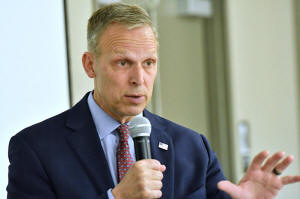Republicans in the toughest swing districts become hard to find for
people angry about Trump
[April 28, 2025]
By STEVE PEOPLES and THOMAS BEAUMONT
MECHANICSBURG, Pa. (AP) — Many days over the past two weeks, no one
answered the phone at any of U.S. Rep. Scott Perry’s four offices.
Perry's team did not share details about the Republican congressman's
public appearances until they were over. Even supporters who live in
Perry's central Pennsylvania district could not remember the last time
he hosted an in-person town hall.
No one opened the locked door at his district office in Mechanicsburg
last week when an Associated Press reporter rang the bell. A male voice
said through the intercom, "I don’t have any public appearance
information that I can provide.”
The U.S. House is ending a 17-day recess, typically known as a district
work period, in which members of Congress return home to focus on their
constituents. But some of the most vulnerable Republicans limited their
potential exposure to the potential backlash from President Donald
Trump’s first months in office.
They are embracing the strategy outlined by GOP leaders in Washington
who argue there is no benefit to creating more viral moments such as the
crowd in Asheville, North Carolina, that booed U.S. Rep. Chuck Edwards
and the pointed questions about tariffs and deportations that were
directed at U.S. Sen. Chuck Grassley of Iowa.
Perry, who won reelection last fall by about 5,000 votes, is one of the
10 most vulnerable House Republicans, as measured by their margins of
victory last fall. They were especially hard to find during the recess,
though it was difficult to verify many of the public schedules due to
the inconsistent responses from their offices.

None of them, a collection of swing-district conservatives from across
Arizona, Colorado, California, Iowa, Nebraska, Pennsylvania and
Wisconsin, hosted in-person events that were open to the public. Just
one planned a telephone town hall. Others favored smaller
invitation-only gatherings with local officials promoted only after they
were over.
The Republicans' lack of access didn't sit well with some voters.
“They’re publicly elected officials. They ought to be accessible to the
public,” Republican voter Robert Barton, a 57-year-old civil engineer,
said as he waited for his lunch at Italian Delight Pizzeria across the
street from Perry's office in Mechanicsburg.
Perry's team did not respond to multiple requests for comment.
Republicans defend their strategy
Veteran GOP strategist Doug Heye argued that interacting with
constituents in “planned and controlled ways” is more productive than
town halls for members of Congress. "And that’s smart for any
politician,” he said.
The National Republican Congressional Committee, the House Republicans’
campaign arm, is not encouraging targeted members to stay out of the
public eye, a spokesperson said.
Instead, the NRCC encourages lawmakers to meet with their constituents
in public, but to be wary of events that could divert attention from a
House member’s message and agenda, according to NRCC spokesman Mike
Marinella.
“We tell everyone, go out and meet people. You have to be in front of
your constituents,” Marinella said. “Use every avenue you can.”
House Speaker Mike Johnson, R-La., recently suggested that some of the
people attending public meetings with members “do this as a profession,
they’re professional protesters.” He urged lawmakers to consider
convening so-called tele-town hall meetings, dial-in conferences where
thousands can listen and lawmakers take questions.
In 2010, under pressure over the health care overhaul that became known
as Obamacare, a number of House Democrats skipped public events after
facing angry town halls the previous summer. Some held tele-town hall
meetings instead.

Then-House Speaker Nancy Pelosi, D-Calif., co-authored an opinion piece
referring to some protests as “un-American” and denouncing an “ugly
campaign (to) disrupt public meetings and prevent members of Congress
and constituents from conducting a civil dialogue.”
Just under a decade later, House Republicans trying to repeal that
health law were accused of ducking town halls as well. Then-House
Speaker Paul Ryan, R-Wis., said he would stop holding town halls to
limit access for protesters from outside his district.
Both the Democrats in 2010 and the Republicans in 2018 would go on to
lose their House majorities.
[to top of second column]
|

U.S. Rep. Scott Perry, R-Pa., speaks during a campaign event in
front of employees at an insurance marketing firm, Oct. 17, 2024, in
Harrisburg, Pa. (AP Photo/Marc Levy, file)

Democrats step in
The Democratic National Committee, backed by organized labor and
other progressive groups in some states, has launched dozens of
“People's Town Halls” and “Good Trouble" events in districts where
Republicans will not hold public events.
Democrats are betting their strategy will give them an advantage in
the 2026 election, when control of Congress will be decided for the
last two years of Trump's final term. Historically, the party that
holds the White House loses seats in these midterms. And as of now,
Republicans would lose the House majority if they lose a net of just
two seats.
Republican National Committee Chairman Michael Whatley put it in
stark terms during an appearance at the Iowa Faith and Freedom
spring fundraiser this month.
“This midterm election cycle is going to determine whether we have a
four-year presidency or a two-year presidency,” Whatley told an
audience of 700 Iowa Republican activists and social conservative
leaders. Referring to the 2018 Democratic House takeover, he warned
of House investigations and a stalled Trump agenda that “knocked the
administration off its feet.”
Where are the Republicans?
Mariannette Miller-Meeks is an Iowa Republican who won last fall by
799 votes, the closest U.S. House election won by a Republican in
the country last year.
She spoke at the Faith and Freedom fundraiser, but she spent the
Easter recess meeting with far smaller groups in more controlled
environments: a wheel accessory plant, several business groups in
the Des Moines and Davenport areas, a Rotary Club meeting, and a
groundbreaking for an eastern Iowa medical center.
Most of her constituents would have learned of the stops by checking
Miller-Meeks’ social media accounts after the fact. Miller-Meeks,
like her fellow most-targeted Republican House members, offered
little if any public notice of her appearances.

Like the other House Republicans in the nation's most-competitive
districts, she held no events open to all constituents, nor had any
planned for the remainder of the break, which ended Sunday.
Aides to U.S. Rep. Don Bacon, who represents Nebraska’s 2nd
Congressional District, confirmed that the Republican held no open
events nor had plans to before the end of the break. Bacon’s X
account included a post from last weekend where he appeared to be
attending an Easter egg hunt in south Omaha.
On the ground in a key swing district
Back in Perry's Harrisburg-area district, Democrats are optimistic
that they are well-positioned to defeat the seven-term Republican, a
former chairman of the hard-line conservative House Freedom Caucus.
He defeated Democrat Janelle Stelson, a former local television
broadcaster, by 5,000 votes last fall. Stelson expects to start
another campaign against Perry in July.
“The title of the job is representative. It’s not actually about
you, it’s about what the people you talk to care about and want you
to accomplish for them,” she said. “And I don’t understand how he
can possibly know what that is when he’s never out among us.”
Some voters have taken notice.
Tim Shollenberger, a Mechanicsburg resident who was a registered
Republican until recently, struggled to be heard during Perry's
April 2 tele-town hall.
Participants were not allowed to ask questions directly, so the
69-year-old trial lawyer submitted three questions in writing: one
about Elon Musk’s critical comments about Social Security and two
about Perry’s lack of public access.
The moderator did not ask any of them.
“If you really care about the views of your constituents, get in a
room and face them," Shollenberger said.
___
Beaumont reported from Des Moines, Iowa.
All contents © copyright 2025 Associated Press. All rights reserved |